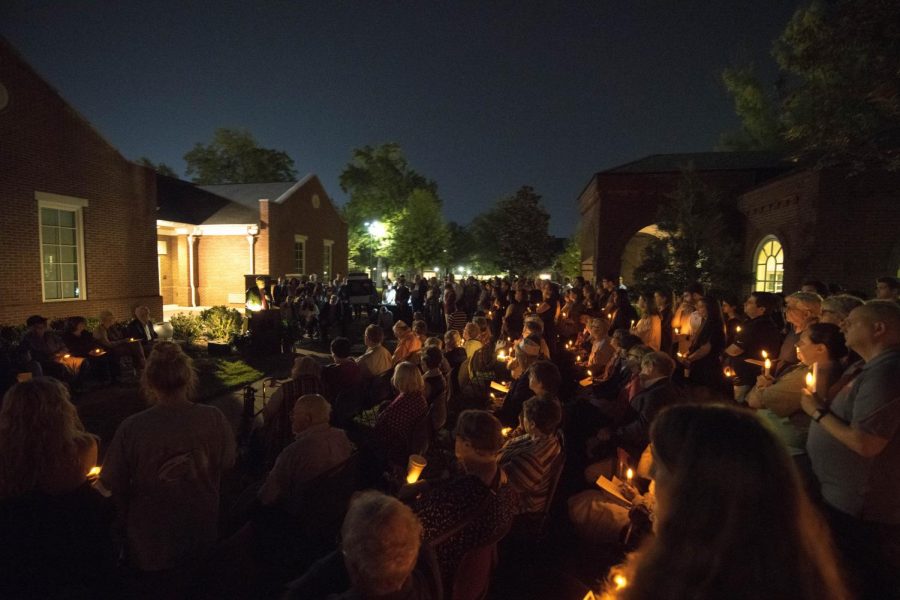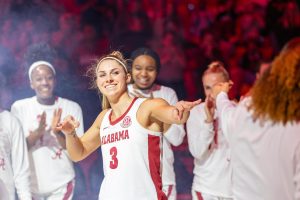University offers community support after shooting
November 15, 2018
Though Pittsburgh may seem far away, to the Tuscaloosa Jewish community, the physical distance doesn’t matter.
Last month the nation saw what is thought to be the deadliest attack on the Jewish community in U.S. history, according to the Anti-Defamation League. A far-right extremist walked into the Tree of Life synagogue during services on Oct. 27 and began shooting, killing 11 people and injuring six others.
Temple Emanu-El and Bama Hillel organized a candlelight vigil for the victims Tuesday, Oct. 30.
“We had an estimated four to five hundred interfaith people show up,” Bama Hillel Executive Director Lisa Besnoy said. “It was really touching to see the outpouring of support that we got from the community and how students came together. … We wrote memorial cards and notes to send to Pittsburgh from the Tuscaloosa community.”
The vigil featured student speakers from Bama Hillel and Zeta Beta Tau, the Jewish fraternity on campus. David Grady, vice president of student life; Pastor Wade Langer of Bama Wesley, president of religious life; and Temple Emanu-El Rabbi Steven Jacobs also spoke.
“It is better to light the candle than curse the darkness,” Jacobs said. “I choose to stand with the candle lighters. On this night in this community, I am grateful that members of the Jewish community have come together to light candles. … We collectively, Jews and non-Jews, regardless of our differences, are the answer to every human being who demeans every other human being.”
In the days following the attack and the vigil, students had resumed their regular activities, but with a different spirit than before.
“I think we’ve come together,” said Aaron Kaboff, a senior majoring in metallurgical engineering. “We’re closer. I think this has brought us together in needing to look out for each other and the community as a whole.”
In addition to the unification of students across campus, the shooting has brought more awareness to the prejudices that still exist today against the Jewish community.
“There’s been a lot more exposure to people, realizing that there’s still anti-Semitism out there,” said Daniel Hemmer, a senior majoring in executive management. “Because you hate to say it, but it’s not really anything new. I was very upset, but I wasn’t that surprised.”
Several Jewish students were concerned with the seeming rise in anti-Semitism in America. Kaboff said it felt like even being in a synagogue put a “target on [his] back.”
“I think people have been more comfortable voicing their anti-Semitic, racist, negative opinions towards minority groups,” graduate student Andrea Pollock said. “I think in our current political and social climate, that for whatever reason people are more comfortable vocalizing those opinions.”
This trend seems to be supported by data from law enforcement. The FBI recorded a 17 percent increase in hate crimes against all minorities in its annual “Hate Crime Statistics report,” released Tuesday. Of the 20 percent of those targeted for their religion, nearly 60 percent of the victims were Jews or Jewish institutions.
“Over the last few years, [white hate groups] have been a little more energized, and that way of thinking has become more normalized, at least in their minds, by what’s going on in our politics,” UA professor of political science Richard Fording said. “There was a spike in the activity of white hate groups after President Obama was elected in 2008, having a black president. … Now, at least from their perspective, [hate groups] feel like they have a friend in the White House. That empowers them and leads them to believe their ideology isn’t so extreme.”
The University of Alabama has been taking steps to protect Jewish students in the aftermath of the Pittsburgh shooting. Lisa Besnoy of Bama Hillel praised the University’s support of the Jewish community.
“One of the things that happened [after the attack] was I got a call from Dr. David Grady of the University, calling me and asking how he could be of assistance to our Jewish student body,” Besnoy said. “The University did provide a [24-hour] UAPD patrol of our area. They also provided safety for our students in terms of their emotional well-being and had a counselor on call.”
The Jewish response to the tragedy in Pittsburgh was overwhelmingly one of unity: remaining strong in spite of fear.
“What I told my children is this is why we hug each other every time we see each other,” Dr. Besnoy said. “That’s why we say ‘I love you.’ That’s why we’re kind to each other, because anything could happen, anywhere, and it’s not your fault. It’s not your fault for being who you are or being in a certain place at a certain time.”





















